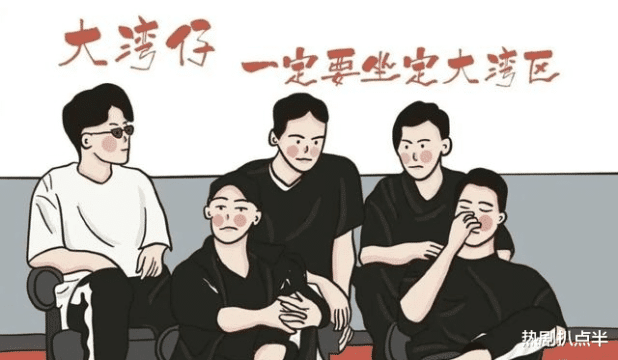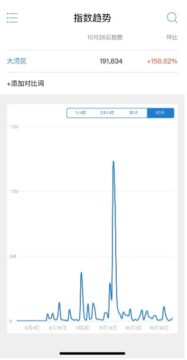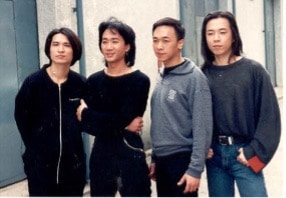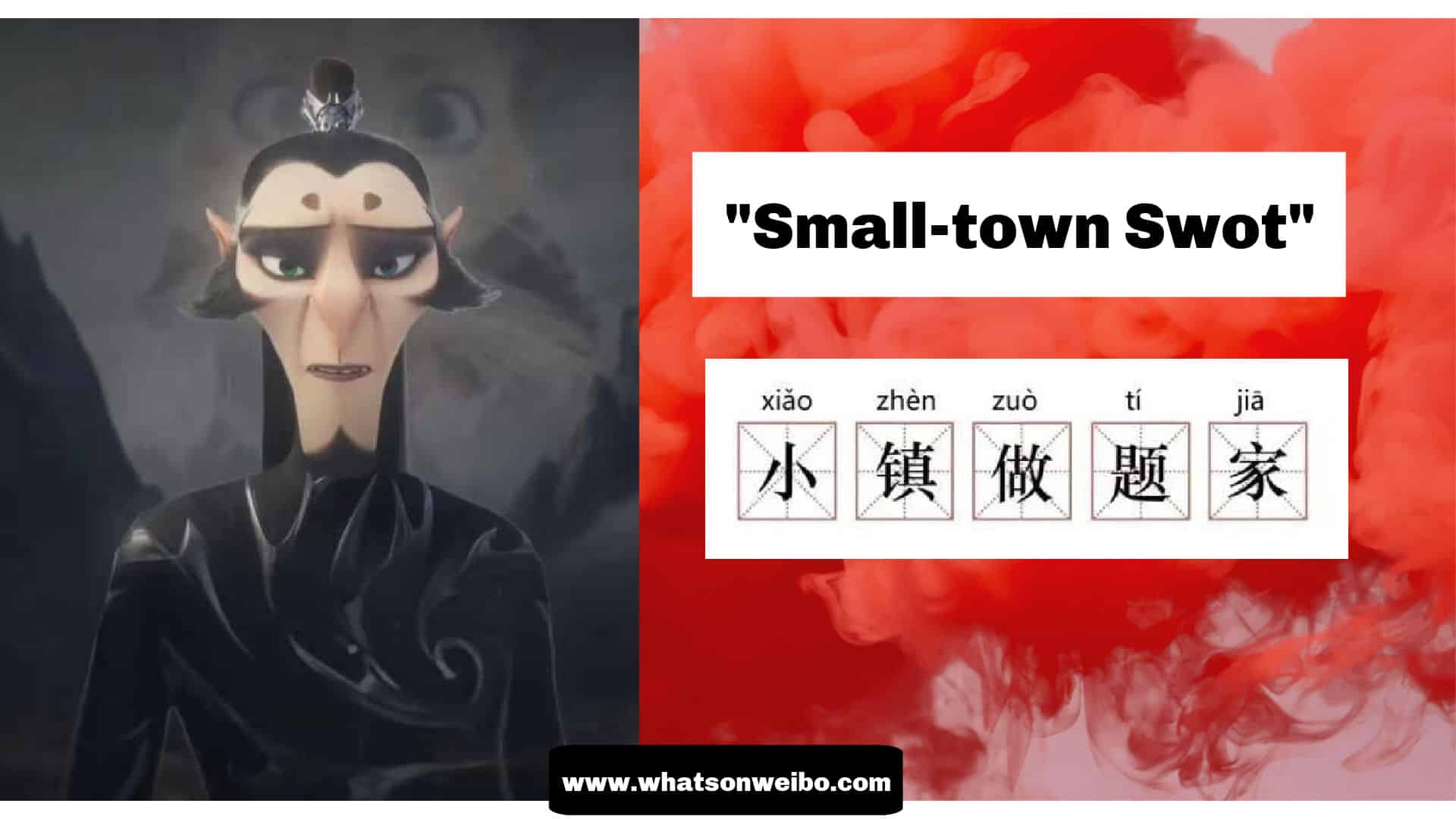China Arts & Entertainment
Hong Kong Stars Shine in Call Me By Fire: ‘Greater Bay Area Brothers’ Go Viral on Chinese Social Media
The popularity of the ‘Greater Bay Area Brothers’ is part of a bigger trend of Hong Kong entertainers finding renewed success in mainland China.
Published
3 years agoon

The Cantonese-speaking celebrities in the hit show Call Me By Fire have contributed to an increased social media interest in the Greater Bay Area, with some saying a ‘Hong Kong Music Revival’ is blossoming in the Chinese entertainment industry. Entertainers from Hong Kong are finding renewed success in mainland China.
Produced by Mango TV, the Chinese all-male variety show Call Me By Fire (披荆斩棘的哥哥) has concluded its super successful first season. With the last episode airing on October 29 of 2021, the show, starring 33 male celebrities, has brought some well-known Hong Kong actors and singers back into the spotlight in mainland China. On social media, they’ve been nicknamed “The Greater Bay Area Brothers” (“大湾区哥哥”) or “The Group of Greater Bay Area” (“大湾区组”).
The Greater Bay Area, also known as ‘Guangdong-Hong Kong-Macao Greater Bay Area’ (粤港澳大湾区) refers to the Chinese government’s scheme to link the cities of Hong Kong, Macau, and some cities in Guangdong Province including Guangzhou, Shenzhen, Zhuhai, Foshan, Zhongshan, Dongguan, Huizhou, Jiangmen, and Zhaoqing, into one major integrated economic and business hub.
In the Call Me By Fire variety show, male celebrities who’ve since long been active in the entertainment industry are competing to form a performance group. The five actors/singers from Hong Kong, including Chen Xiaochun (陈小春/Chan Siu Chun), Zhang Zhilin (张智霖/Cheung Chi-lam), Xie Tianhua (谢天华/Tse Tin-wah), Lin Xiaofeng (林晓峰/Lamb Hiu-fung) and Liang Hanwen (梁汉文/Leung Hon-man), have been in one group together ever since the first episode of the popular reality show.

(Zhang Zhilin, Lin Xiaofeng, Xie Tianhua, Chen Xiaochun, Liang Hanwen)
When group member Xie joked about their ‘too relaxed’ attitude in the first episode – while other people were busy practicing, – he referred to their group as “The Greater Bay Guys” (“大湾仔”). This seeded the concept to the audience, who adopted the term to refer to the team.

Illustration of The Greater Bay Guys, source http://dianyingfengyun.com/
On Chinese social media, the five Cantonese-speaking artists of the group then started to go viral as “The Greater Bay Area Brothers” (大湾区哥哥). Other Cantonese-speaking artists in the show including Huang Guanzhong (黄贯中/Wong Koon-chung) and Ouyang Jin (欧阳靖/Jin Au-Yeung aka MC Jin) also came to be regarded as ‘extra’ members of the group.
Various social media users call the success of the Greater Bay Brothers a sign of a greater “Hong Kong Music Revival” (“港乐复兴”). But the trend goes beyond music alone, as actors and comedians from Hong Kong are also increasingly moving to the mainland industry.
“The Greater Bay” Goes Trending
Recently. the the “Greater Bay Area” (大湾区) term was added to numerous Weibo hashtags relating to the show, garnering many views. Some examples:
- “The Aim of the Greater Bay Area Five is to Be Bigger and Stronger” (#大湾区五人组的目标是做大做强#)– 60 million views
- “The Five of the Greater Bay Area Are Soo Hilarious” (#被大湾区五人组笑死#) – 210 million views
- “All Members of the Greater Bay Area Team Act like They Have Social Phobia: (#大湾区全体社恐#) – 230 million views
- “LOL for the Greater Bay Area Team Choosing New Members” (#被大湾区选人笑死#) – 190 million views
- “LOL for the Greater Bay Area Team Speaking Mandarin” (#被大湾区的普通话笑死#) – 240 million views
- “Cantonese Rap by the Greater Bay Area Team” (#大湾区唱的粤语rap#) – 190 million views
- “The Water Stage of the Greater Bay Area Team Is Just So Cool” (#大湾区水舞台太酷了#) – 130 million views
- “The Greater Bay Area Brothers Recreate Iconic Scenes of the Show” (#大湾区哥哥再现名场面#) – 110 million views
The official data analysis tool of Sina Weibo, the Weibo Index (@微指数), shows that from August 12, when the first episode of the show aired, the trend volume for the “Greater Bay Area” (大湾区) started to peak.
Besides the Call Me By Fire show, other news about the Greater Bay area also contributed to this peak.

On August 26, the General Office of the State Council of the People’s Republic of China announced that Guangdong Province, Hong Kong, and Macau would host the 2025 National Games of China together.
Following the announcement on the closing ceremony of the 14th National Games of China in Xi’an, netizens made the Chief Executive of Hong Kong, Carrie Lam, go to the top trending lists with the hashtag “Carrie Lam Accepts the Flag of National Games of China” (#林郑月娥接过全运会会旗#) which received more than 100 million views.
Along with the hashtag created for Lam, another hashtag about the announcement using the ‘Greater Bay Area’ term also went trending that day and received more than 170 million views (“2025 National Games to Be Held in the Greater Bay Area” #2025全运会将在大湾区举办#).

The recent social media trend peak for ‘Greater Bay Area’ occurred on September 21, the night of the Mid-Autumn Festival, when a concert was simultaneously held in Shenzhen (main venue) and Hong Kong (sub-venue). The concert was live-streamed on national platforms and shown in Hong Kong by public broadcasters. The hashtag of the concert, “The Full Moon Rises in the Great Bay Area” (#湾区升明月#), received over 1.38 billion (!) views.
The ‘Greater Bay Brothers’ were also invited to perform at the concert, along with many other singers from mainland China, Hong Kong, Macau, and Taiwan. More than one-third of the songs performed at the concert were in Cantonese. A Hong Kong movies montage of clips also quickly went viral on Weibo, leading Chinese netizens to share memories of watching these movies again and again.
All of these recent trending topics show how much Cantonese songs and movies resonate with netizens in mainland China. Especially for those born in the 1970-1990 era, Hong Kong popular culture has become a part of their childhood memories.
Finding Renewed Success in the Mainland
The five members of the Greater Bay Group in Call Me By Fire and its extra Cantonese-speaking members are mostly known by the mainland audience because of their songs or for the drama series or films they starred in.
For example, Huang Guanzhong is known as a member of the legendary band Beyond, while Chen Xiaochun became popular because of his role as Wei Xiaobao (韦小宝) in the TV drama The Deer and the Cauldron (鹿鼎记), and for playing “Chicken” Chiu (山鸡哥) in the Young and Dangerous film series (古惑仔系列电影). His songs, Heartless You (算你恨) and Exclusive Memory (独家记忆) were also very popular in mainland China in the early 2000s.
Zhang Zhilin is widely known by audiences in mainland China due to his role in The Legend of the Condor Heroes (射雕英雄传) produced by TVB in 1994. Other TV dramas such as Return of the Cuckoo (十月初五的月光) and Triumph in the Skies II (冲上云霄2) further boosted his popularity in the mainland.

The legendary band Beyond, the first one on the right is Huang Guanzhong.

Chen Xiaochun in “The Deer and the Cauldron” as Wei Xiaobao, and in the “Young and Dangerous” Film Series as “Chicken” Chiu.

Zhang Zhilin in “The Legend of the Condor Heroes” as Guo Jing (郭靖), and in the “Triumph in the Skies II” as Captain Cool.
There was a time when singers or actors in mainland China, including the two other Greater Bay Area Brothers Zhao Wenzhuo (赵文卓) and Zhang Jin (张晋), would move to Hong Kong for better career development. Along with the fast developments of the entertainment industry in mainland China, things have changed. Some Hong Kong artists have now begun to shift their career focus to mainland China.
One example is the Hong Kong actress Sheh Shiman (佘诗曼, also known as Charmaine Sheh), who started her career by winning second runner-up in the 1997 Miss Hong Kong pageant. She stood out for her roles in Return of the Cuckoo in 2000 (partnering with Zhang Zhilin) and War and Beauty (金枝欲孽) in 2004.

Sheh Shiman and Zhang Zhilin in Return of the Cuckoo.
In 2011, Sheh decided not to renew her long-term contract with TVB, and started to focus more on acting in TV dramas in mainland China. In 2018, she starred in the hugely popular The Story of Yanxi Palace and gained many fans in the mainland for her acting skills. She was also nominated for Best Supporting Actress at the 24th Huading Awards – China’s equivalent to the American People’s Choice Awards.

Sheh Shiman in the Story of Yanxi Palace.
Another example of a Hong Kong entertainer achieving new career success in mainland China is Wang Zulan (王祖蓝/Wong Cho-lam). As a comedian, Wang has been participating in various variety shows. He is well known by the mainland audience for impersonating different celebrities or story characters.

In March 2018, a group of senior Hong Kong artists set up the Association for Betterment of Hong Kong’s Entertainment Industry in Mainland China (HKEIMC) in Hong Kong in the hope of becoming a bridge between the mainland and Hong Kong, Macau, and promoting more exchanges and cooperation within the entertainment industry.
The HKEIMC also aims to help the development of Hong Kong and Macao artists in mainland China, with Jacky Chan (成龙) as the chairman and Zeng Zhiwei (曾志伟/Tsang Chi Wai) as the executive chairman.
Talking about the founding of HKEIMC, Vice President Wang Mingquan (汪明荃/Wang Ming-chun) said that most of the local residents in the Greater Bay Area already communicate in Cantonese and watch Hong Kong TV programs, suggesting that the cultural differences are relatively small and that there is more room for cooperation.
The entertainment industry in Hong Kong has recently shown more signs of moving to the mainland. Earlier in 2021, for example, Emperor Entertainment Group (EEG), one of the largest entertainment groups in Hong Kong, announced the opening of its Greater Bay Area headquarter office in Guangzhou.
More Greater Bay Coming to China’s Mainstream Entertainment
As Call Me By Fire has geared up the audience’s huge interest in the Greater Bay Area, it is reported that a new variety show featuring the five brothers of the Greater Bay Area named Nights of the Greater Bay Guys (大湾仔的夜) has already started filming.
In addition, audiences interested in Cantonese songs can also expect a new singing show which will be co-produced by Mango TV and TVB. The producer of the show, Wang Zulan, said in a recent interview that he will bring his ten years of experience in the mainland back to Hong Kong and the Greater Bay Area at large.
All of these recent developments are signs of a more flourishing future for the entertainment industry in mainland China, presenting more job opportunities for artists from Hong Kong.
“As Hong Kong singers are gathering in mainland variety shows and the Greater Bay Brothers are now going viral across the country, is this the 2021 beginning of the great ‘Cantopop’ revival?”, some Weibo users wonder. It may very well be.
By Wendy Huang
Follow @whatsonweibo
Spotted a mistake or want to add something? Please let us know in comments below or email us. Please note that your comment below will need to be manually approved if you’re a first-time poster here.
©2021 Whatsonweibo. All rights reserved. Do not reproduce our content without permission – you can contact us at info@whatsonweibo.com
Wendy Huang is a China-based Beijing Language and Culture University graduate who currently works for a Public Relations & Media software company. She believes that, despite the many obstacles, Chinese social media sites such as Weibo can help Chinese internet users to become more informed and open-minded regarding various social issues in present-day China.

China Arts & Entertainment
How K-pop Fans and the 13-Year-Old Daughter of Baidu VP Sparked a Debate on Online Privacy
What began as K-pop fan outrage targeting a snarky commenter quickly escalated into a Baidu-linked scandal and a broader conversation about data privacy on Chinese social media.
Published
3 weeks agoon
March 26, 2025By
Ruixin Zhang
For an ordinary person with just a few followers, a Weibo account can sometimes be like a refuge from real life—almost like a private space on a public platform—where, along with millions of others, they can express dissatisfaction about daily annoyances or vent frustration about personal life situations.
But over recent years, even the most ordinary social media users could become victims of “opening the box” (开盒 kāihé)—the Chinese internet term for doxxing, meaning the deliberate leaking of personal information to expose or harass someone online.
A K-pop Fan-Led Online Witch Hunt
On March 12, a Chinese social media account focusing on K-pop content, Yuanqi Taopu Xuanshou (@元气桃浦选手), posted about Jang Wonyoung, a popular member of the Korean girl group IVE. As the South Korean singer and model attended Paris Fashion Week and then flew back the same day, the account suggested she was on a “crazy schedule.”
In the comment section, one female Weibo user nicknamed “Charihe” replied:
💬 “It’s a 12-hour flight and it’s not like she’s flying the plane herself. Isn’t sleeping in business class considered resting? Who says she can’t rest? What are you actually talking about by calling this a ‘crazy schedule’..”

Although the comment may have come across as a bit snarky, it was generally lighthearted and harmless. Yet unexpectedly, it brought disaster upon her.
That very evening, the woman nicknamed Charihe was bombarded with direct messages filled with insults from fans of Jang Wonyoung and IVE.
Ironically, Charihe’s profile showed she was anything but a hater of the pop star—her Weibo page included multiple posts praising Wonyoung’s beauty and charm. But that context was ignored by overzealous fans, who combed through her social media accounts looking for other posts to criticize, framing her as a terrible person.
After discovering through Charihe’s account that she was pregnant, Jang Wonyoung’s fans escalated their attacks by targeting her unborn child with insults.
The harassment did not stop there. Around midnight, fans doxxed Charihe, exposing her personal information, workplace, and the contact details of her family and friends. Her friends were flooded with messages, and some were even targeted at their workplaces.
Then, they tracked down Charihe’s husband’s WeChat account, sent him screenshots of her posts, and encouraged him to “physically punish” her.
The extremity of the online harassment finally drew backlash from netizens, who expressed concern for this ordinary pregnant woman’s situation:
💬 “Her entire life was exposed to people she never wanted to know about.”
💬 “Suffering this kind of attack during pregnancy is truly an undeserved disaster.”
Despite condemnation of the hate, some extreme self-proclaimed “fans” remained relentless in the online witch hunt against Charihe.
Baidu Takes a Hit After VP’s 13-Year-Old Daughter Is Exposed
One female fan, nicknamed “YourEyes” (@你的眼眸是世界上最小的湖泊), soon started doxxing commenters who had defended her. The speed and efficiency of these attacks left many stunned at just how easy it apparently is to trace social media users and doxx them.
Digging into old Weibo posts from the “YourEyes” account, people found she had repeatedly doxxed people on social media since last year, using various alt accounts.
She had previously also shared information claiming to study in Canada and boasted about her father’s monthly salary of 220,000 RMB (approx. $30.3K), along with a photo of a confirmation document.
Piecing together the clues, online sleuths finally identified her as the daughter of Xie Guangjun (谢广军), Vice President of Baidu.
From an online hate campaign against an innocent, snarky commenter, the case then became a headline in Chinese state media, and even made international headlines, after it was confirmed that the user “YourEyes”—who had been so quick to dig up others’ personal details—was in fact the 13-year-old daughter of Xie Guangjun, vice president at one of China’s biggest tech giants.
On March 17, Xie Guangjun posted the following apology to his WeChat Moments:

💬 “Recently, my 13-year-old daughter got into an online dispute. Losing control of her emotions, she published other people’s private information from overseas social platforms onto her own account. This led to her own personal information also getting exposed, triggering widespread negative discussion.
As her father, I failed to detect the problem in time and failed to guide her in how to properly handle the situation. I did not teach her the importance of respecting and protecting the privacy of others and of herself, for which I feel deep regret.
In response to this incident, I have communicated with my daughter and sternly criticized her actions. I hereby sincerely apologize to all friends affected.
As a minor, my daughter’s emotional and cognitive maturity is still developing. In a moment of impulsiveness, she made a wrong decision that hurt others and, at the same time, found herself caught in a storm of controversy that has subjected her to pressure and distress far beyond her age.
Here, I respectfully ask everyone to stop spreading related content and to give her the opportunity to correct her mistakes and grow.
Once again, I extend my apologies, and I sincerely thank everyone for your understanding and kindness.”
The public response to Xie’s apology has been largely negative. Many criticized the fact that it was posted privately on WeChat Moments rather than shared on a public platform like Weibo. Some dismissed the statement as an attempt to pacify Baidu shareholders and colleagues rather than take real accountability.
Netizens also pointed out that the apology avoided addressing the core issue of doxxing. Concerns were raised about whether Xie’s position at Baidu—and potential access to sensitive information—may have helped his daughter acquire the data she used to doxx others.
Adding fuel to the speculation were past conversations allegedly involving one of @YourEyes’ alt accounts. In one exchange, when asked “Who are you doxxing next?” she replied, “My parents provided the info,” with a friend adding, “The Baidu database can doxx your entire family.”
Following an internal investigation, Baidu’s head of security, Chen Yang (陈洋), stated on the company’s internal forum that Xie Guangjun’s daughter did not obtain data from Baidu but from “overseas sources.”
However, this clarification did little to reassure the public—and Baidu’s reputation has taken a hit. The company has faced prior scandals, most notably a the 2016 controversy over profiting from misleading medical advertisements.
Online Vulnerability
Beyond Baidu’s involvement, the incident reignited wider concerns about online privacy in China. “Even if it didn’t come from Baidu,” one user wrote, “the fact that a 13-year-old can access such personal information about strangers is terrifying.”
Using the hashtag “Reporter buys own confidential data” (#记者买到了自己的秘密#), Chinese media outlet Southern Metropolis Daily (@南方都市报) recently reported that China’s gray market for personal data has grown significantly. For just 300 RMB ($41), their journalist was able to purchase their own household registration data.
Further investigation uncovered underground networks that claim to cooperate with police, offering a “70-30 profit split” on data transactions.
These illegal data practices are not just connected to doxxing but also to widespread online fraud.
In response, some netizens have begun sharing guides on how to protect oneself from doxxing. For example, they recommend people disable phone number search on apps like WeChat and Alipay, hide their real name in settings, and avoid adding strangers, especially if they are active in fan communities.
Amid the chaos, K-pop fan wars continue to rage online. But some voices—such as influencer Jingzai (@一个特别虚荣的人)—have pointed out that the real issue isn’t fandom, but the deeper problem of data security.
💬 “You should question Baidu, question the telecom giants, question the government, and only then, fight over which fan group started this.”
As for ‘Charihe,’ whose comment sparked it all—her account is now gone. Her username has become a hashtag. For some, it’s still a target for online abuse. For others, it is a reminder of just how vulnerable every user is in a world where digital privacy is far from guaranteed.
By Ruixin Zhang
Independently covering digital China for over a decade. Like what we do? Support us and get the story behind the hashtag by subscribing:
edited for clarity by Manya Koetse
Spotted a mistake or want to add something? Please let us know in comments below or email us. First-time commenters, please be patient – we will have to manually approve your comment before it appears.
©2024 Whatsonweibo. All rights reserved. Do not reproduce our content without permission – you can contact us at info@whatsonweibo.com.
China Memes & Viral
How Ne Zha 2’s Shen Gongbao Became Known as the Ultimate “Small-Town Swot”
Published
2 months agoon
March 1, 2025
PART OF THIS TEXT COMES FROM THE WEIBO WATCH PREMIUM NEWSLETTER
Over the past few weeks, the Chinese blockbuster Ne Zha 2 has been trending on Weibo every single day. The movie, loosely based on Chinese mythology and the Chinese canonical novel Investiture of the Gods (封神演义), has triggered all kinds of memes and discussions on Chinese social media (read more here and here).
One of the most beloved characters is the leopard demon Shen Gongbao (申公豹). While Shen Gongbao was a more typical villain in the first film, the narrative of Ne Zha 2 adds more nuance and complexity to his character. By exploring his struggles, the film makes him more relatable and sympathetic.
In the movie, Shen is portrayed as a sometimes sinister and tragic villain with humorous and likeable traits. He has a stutter, and a deep desire to earn recognition. Unlike many celestial figures in the film, Shen Gongbao was not born into privilege and never became immortal. As a demon who ascended to the divine court, he remains at the lower rungs of the hierarchy in Chinese mythology. He is a hardworking overachiever who perhaps turned into a villain due to being treated unfairly.
Many viewers resonate with him because, despite his diligence, he will never be like the gods and immortals around him. Many Chinese netizens suggest that Shen Gongbao represents the experience of many “small-town swots” (xiǎozhèn zuòtíjiā 小镇做题家) in China.
“Small-town swot” is a buzzword that has appeared on Chinese social media over the past few years. According to Baike, it first popped up on a Douban forum dedicated to discussing the struggles of students from China’s top universities. Although the term has been part of social media language since 2020, it has recently come back into the spotlight due to Shen Gongbao.
“Small-town swot” refers to students from rural areas and small towns in China who put in immense effort to secure a place at a top university and move to bigger cities. While they may excel academically, even ranking as top scorers, they often find they lack the same social advantages, connections, and networking opportunities as their urban peers.
The idea that they remain at a disadvantage despite working so hard leads to frustration and anxiety—it seems they will never truly escape their background. In a way, it reflects a deeper aspect of China’s rural-urban divide.
Some people on Weibo, like Chinese documentary director and blogger Bianren Guowei (@汴人郭威), try to translate Shen Gongbao’s legendary narrative to a modern Chinese immigrant situation, and imagine that in today’s China, he’d be the guy who trusts in his hard work and intelligence to get into a prestigious school, pass the TOEFL, obtain a green card, and then work in Silicon Valley or on Wall Street. Meanwhile, as a filial son and good brother, he’d save up his “celestial pills” (US dollars) to send home to his family.
Another popular blogger (@痴史) wrote:
“I just finished watching Ne Zha and my wife asked me, why do so many people sympathize with Shen Gongbao? I said, I’ll give you an example to make you understand. Shen Gongbao spent years painstakingly accumulating just six immortal pills (xiāndān 仙丹), while the celestial beings could have 9,000 in their hand just like that.
It’s like saving up money from scatch for years just to buy a gold bracelet, only to realize that the trash bins of the rich people are made of gold, and even the wires in their homes are made of gold. It’s like working tirelessly for years to save up 60,000 yuan ($8230), while someone else can effortlessly pull out 90 million ($12.3 million).In the Heavenly Palace, a single meal costs more than an ordinary person’s lifetime earnings.
Shen Gongbao seems to be his father’s pride, he’s a role model to his little brother, and he’s the hope of his entire village. Yet, despite all his diligence and effort, in the celestial realm, he’s nothing more than a marginal figure. Shen Gongbao is not a villain, he is just the epitome of all of us ordinary people. It is because he represents the state of most of us normal people, that he receives so much empathy.”
In the end, in the eyes of many, Shen Gongbao is the ultimate small-town swot. As a result, he has temporarily become China’s most beloved villain.
By Manya Koetse, with contributions by Wendy Huang
Follow @whatsonweibo
Spotted a mistake or want to add something? Please let us know in comments below or email us. Please note that your comment below will need to be manually approved if you’re a first-time poster here.
©2025 Whatsonweibo. All rights reserved. Do not reproduce our content without permission – you can contact us at info@whatsonweibo.com
Subscribe
China Trending Week 15/16: Maozi & Meigui Fallout

China Reacts: 3 Trending Hashtags Shaping the Tariff War Narrative

No Quiet Qingming: From High-Tech Tomb-Sweeping to IShowSpeed & the Seven China Streams

From Trade Crisis to Patriotic Push: Chinese Online Reactions to Trump’s Tariffs

China Trending Week 14: Gucci Fake Lipstick, Xiaomi SU7 Crash, Yoon’s Impeachment

“Dear Li Hua”: The TikTok/Xiaohongshu Honeymoon Explained

Beyond the Box Office: What’s Behind Ne Zha 2’s Success?

Weibo Watch: A New Chapter

15 Years of Weibo: The Evolution of China’s Social Media Giant

Tuning Into the Year of the Snake

IShowSpeed in China: Streaming China’s Stories Well

TikTok Refugees, Xiaohongshu, and the Letters from Li Hua

The ‘China-chic Girl’ Image and the Realities of China’s Competitive Food Delivery Market

US-Russia Rapprochement and “Saint Zelensky”: Chinese Online Reactions to Trump’s Shake-Up

“Black Myth: Wukong”: From Gaming Screens to the CMG Spring Festival Gala?
Get in touch
Would you like to become a contributor, or do you have any tips or suggestions? Get in touch here!
Popular Reads
-

 China Insight11 months ago
China Insight11 months agoThe Tragic Story of “Fat Cat”: How a Chinese Gamer’s Suicide Went Viral
-

 China Digital10 months ago
China Digital10 months agoChina’s 2024 Gaokao Triggers Online Discussions on AI
-

 China Arts & Entertainment11 months ago
China Arts & Entertainment11 months agoSinging Competition or Patriotic Fight? Hunan TV’s ‘Singer 2024’ Stirs Nationalistic Sentiments
-

 China Arts & Entertainment12 months ago
China Arts & Entertainment12 months ago“Old Bull Eating Young Grass”: 86-Year-Old Chinese Painter Fan Zeng Marries 36-Year-Old Xu Meng





